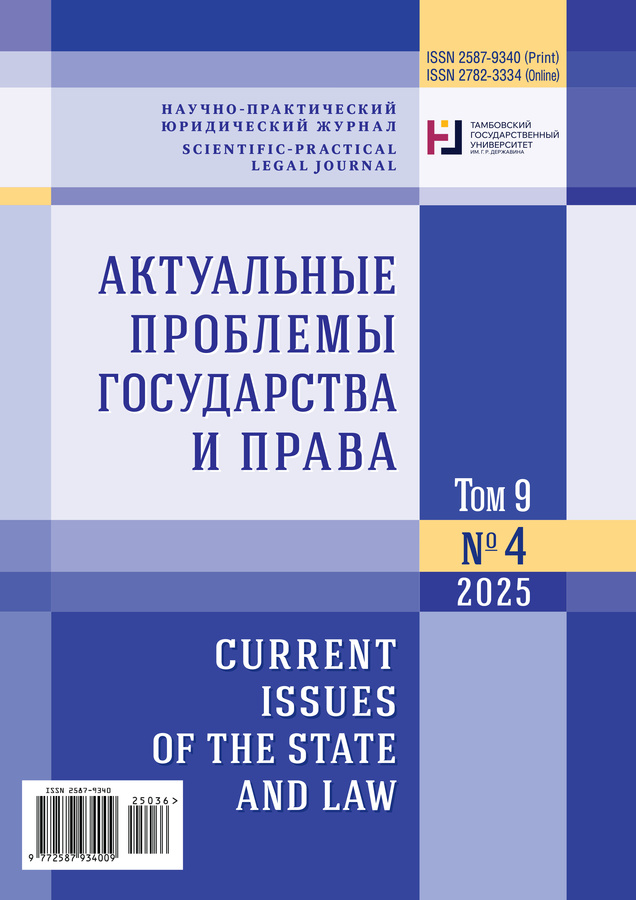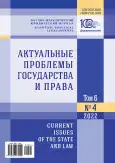Особенности методологии проектной деятельности в юридической науке и образовании
- Авторы: ЛАРИНА Е.А.1
-
Учреждения:
- ФГБОУ ВО «Тамбовский государственный университет им. Г.Р. Державина»
- Выпуск: Том 6, № 4 (2022)
- Страницы: 523-531
- Раздел: Общая теория и история права и государства
- URL: https://journal-vniispk.ru/2587-9340/article/view/303882
- ID: 303882
Цитировать
Аннотация
Рассмотрен популярный и зарекомендовавший себя на практике метод проектов в контексте его применения в деятельности органов государственной и муниципальной власти по разработке проектов нормативных правовых актов, деятельности общественных организаций, задействованных в правовой сфере, практикующих юристов, деятельности университетов и студентов. Обоснована возможность применения проектного метода в практической юридической деятельности, а также в процессе обучения молодых специалистов как одного из самых эффективных методов осуществления указанной деятельности. Применен сравнительный метод при рассмотрении зарубежного опыта, а также анализ при рассмотрении возможностей применения проектного метода применительно к каждой из названных сфер. Синтез применен при обобщении различных направлений участия студентов в проектной деятельности. В ходе исследования сформулирована авторская классификация видов проектной деятельности в юриспруденции с учетом ключевого лица, осуществляющего проектную деятельность, а также масштаба проекта. Результаты данного исследования применимы как в рамках указанных областей проектной деятельности, сформулированных в исследовании, так и при обучении специалистов в сфере юриспруденции в рамках формирования у них новых компетенций – навыка работы с проектами. Результаты исследования могут найти применение в общем виде и в других областях знания, поскольку рассматриваемый метод не связан лишь с юридической деятельностью. Сделан вывод о том, что реализация проектов происходит по различным направлениям, имея различные цели, и их наиболее эффективное достижение возможно при участии различных субъектов: органов власти, общественных организаций, бизнеса, учебных заведений (школ, колледжей, техникумов, вузов), студентов, обучающихся по юридическим и неюридическим специальностям, и т. д.
Ключевые слова
Об авторах
Елена Александровна ЛАРИНА
ФГБОУ ВО «Тамбовский государственный университет им. Г.Р. Державина»
Автор, ответственный за переписку.
Email: ya.lari2011@yandex.ru
ORCID iD: 0000-0002-5892-1959
кандидат педагогических наук, кандидат юридических наук, доцент кафедры теории и истории государства и права Института права и национальной безопасности
Россия, Российская Федерация, 392000 г. Тамбов, ул. Интернациональная, 33Список литературы
- Управление проектами: основы профессиональных знаний, национальные требования к компетенции специалистов / под ред. В.И. Воропаева. М., 2010. 246 с.
- Кагаров Е.Г. Метод проектов в трудовой школе. Л.: Брокгауз-Ефрон, 1926. 88 с.
- Ларина Е.А., Абрамова П.В. Правовая жизнь и правовая политики в современном государстве // Проблемы современных интеграционных процессов и пути их решения: сб. ст. Междунар. науч.-практ. конф.: в 2 ч. Уфа, 2017. Ч. 2. С. 168-172.
- Ларина Е.А., Кузнецова В.А. Политическая роль общественных объединений на примере Тамбовского региона // Правовое регулирование в условиях модернизации государственности: национальный и международный аспекты: сб. ст. Междунар. науч.-практ. конф. Челябинск, 2017. С. 86-91.
- Полат Е.С. Метод проектов на уроках иностранного языка // Иностранные языки в школе. 2000. № 3. С. 4-8.
- Маланов И.А., Бальжиев Б.А. Проектная деятельность как средство повышения профессиональной подготовки будущих юристов // Вестник Бурятского государственного университета. 2017. № 4. С. 80-85.
- Ларина Е.А. Проектные технологии как средство формирования экологической культуры студентов средних специальных учебных заведений // Вестник Тамбовского университета. Серия: Гуманитарные науки. 2013. № 4 (120). С. 241-246.
- Рыжкова И.В. и др. Значение проектной деятельности в профессионально-правовой подготовке студентов, осуществляемой в рамках технологии проектного обучения дисциплины «Правоведение» // Международный научно-исследовательский журнал. 2016. № 10 (52). С. 187-189.
- Проектное обучение. Практики внедрения в университетах / под ред. Л.А. Евстратовой, Н.В. Исаевой, О.В. Лешукова. М., 2018. 154 с.
Дополнительные файлы









